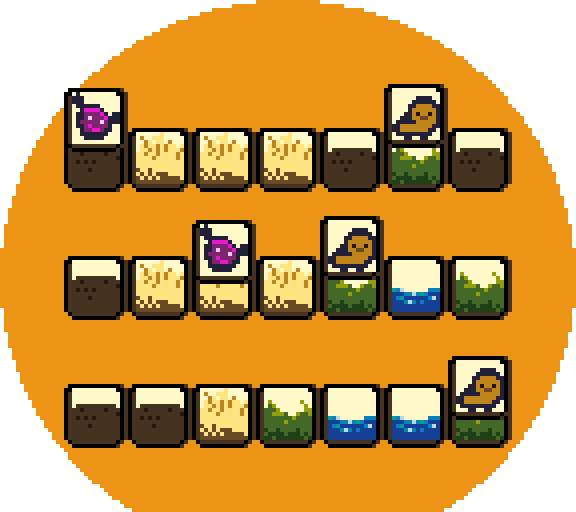Devlog (4): Context
Hi,
Perhaps my chaotic devlogs aren't exactly painting a picture of the end product or my vision for Xylem. I think it might be time to explain a little better what's in store for those of you who stick around!
Here you can see a very rudimentary slice / example of the main board layout¹. Biomes are the static tiles here, and the moving tiles are all organism cards (in this case.)
Why not break down the elevator pitch from the main page:
Welcome to Xylem, an innovative solo gaming experience centered around a building a dynamic ecosystem. Observe intricate environments influenced by the strategic turn-based placement of tiles. Select these tiles from various biomes, mechanical components, and a diverse array of organisms to populate your board, and watch unexpected interplays unfold. Over time, unlock new ways to examine the small world you cultivate with various science kits. Xylem aims to be part game, part tool, part opportunity for open-ended exploration!
Starting with a high level perspective - Xylem is a turn-based ecology simulator. As the player you have access to three basic resources, tiles, health, and energy². Each turn you will be dealt a few tile into a hand to play, though I'm considering a notable change, Xylem may end up functioning more like a roguelike deck-builder of sorts³. After this you will play tiles from your hand onto the board, with each costing some amount of energy to play. If you decide you are done playing tiles or if you have no more energy left, you will end your turn. Skipping a turn (meaning you end your turn without playing at least a single tile) will cause you to lose a single heart. The only way to lose the game is to run out of hearts.
Your hand of tiles comes with three distinct types: organisms, machines, and biomes. Once a tile is placed and the turn has been ended, that tile is no longer under your control. It will go about its merry way, functioning however it does. Organisms and machines function similarly in that they have many diverse actions they might take on any given turn. Biomes mostly just sit there, looking pretty, but they do receive input from, and provide output to all neighboring tiles (including other biomes!) One possibly confusing element is that the board is composed of substrate tiles, yet these do function as a basic biome tile, just without particularly useful/interesting attributes. Biome tiles therefore, are played directly onto these substrate spaces. That's generally the core game loop. Games will progress until you run out of hearts.
I'm designing it to be part game, part exploratory tool. While I don't yet feel confident enough about the specifics of the Science Kits to discuss them, there will likely be five. They, as well as sets of new tiles, will be unlockable over the course of the game. The kits will facilitate taking it from a very opaque strategy game, to a tool for examining the dynamic systems of Xylem at various levels of granularity.
Hopefully this helps explain the basic vision for the project. As always if you have any questions or comments, feel free to leave them here or on the main game page!
Eli
¹ This is just a quick mockup of the board layout, it is not an indication of the games visuals at all!
² The names of resources (and basically everything else) are subject to change.
³ I find I really enjoy the strategy of slowly selecting cards but I'm on the fence if it would work like the bulk of the genre (i.e. you get to select a new tile every few turns, which gets added to the pool) or if I'd rather it work more similarly to something like Terracards. The method there is to assign a a few tiles to select from every so often, and the player receives a few copies of the selected tile. The difference is that once a tile is played, it's gone. I think that's more conducive to Xylem, but I suspect it may require A/B testing for me to decide.
Xylem
| Status | Prototype |
| Author | Threeli |
| Genre | Strategy |
| Tags | Abstract, Casual, Life Simulation, Pixel Art, Relaxing, Surreal, Turn-based |
More posts
- Devlog (6): A light break74 days ago
- Devlog (5): The Halting Problem88 days ago
- Devlog (3): AlgoRhythms95 days ago
- Devlog (2): First Steps98 days ago
- Devlog (1): Forward.Feb 05, 2024
Leave a comment
Log in with itch.io to leave a comment.